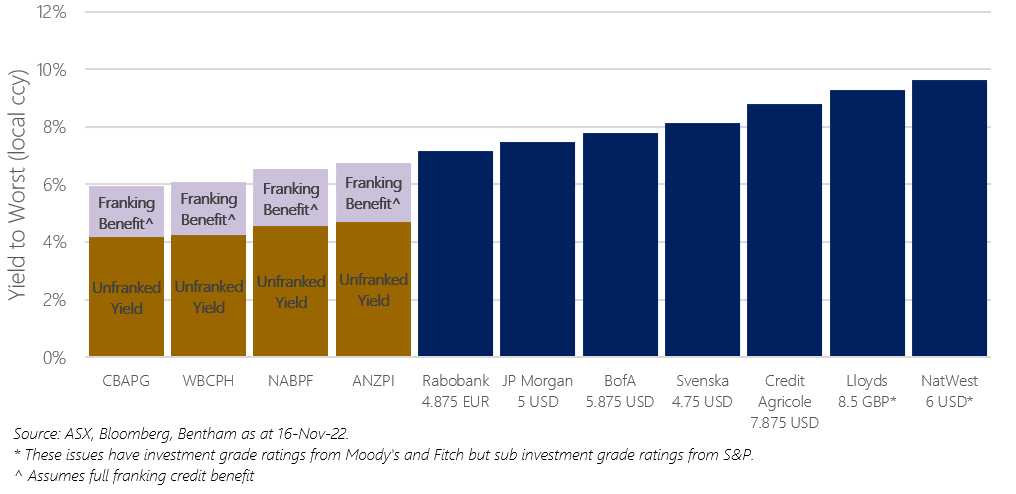Like hybrids? Try global hybrids
Global fixed income and credit markets have had a historically weak 12 months of performance as surging inflation has seen global central banks make fast-paced globally coordinated rate hikes. The performance of global bank hybrids has also been negatively impacted.
This underperformance of global bank hybrids has opened up an opportunity for active investors to capture much higher yields, particularly when compared with ASX hybrids. Currently, the Yield (AUD hedged) on hybrids issued by highly rated European and U.S. banks ranges from 7.2% to 11.2%, which is 2-3% higher than Australian Major bank hybrids.
The total return for the 12 months to October 2022 for the Global Contingent Convertible securities index (CoCos) (AUD hedged) was -15.6%. The average price for the securities in the index has fallen to $85. In contrast, ASX-listed bank hybrids have been relatively stable, returning 1.7% over the same time period and are trading at an average price of $102.
The relative value of offshore hybrids has increased

Sources: Bloomberg, Bentham up until 31 Oct 2022. ASX Major Hybrids represented as an equal weight index
Similar credit risk, but higher yields
The financial strength of Australian banks is well known by Australian investors who are comfortable in retaining exposure to ASX hybrids. We believe that this comfort has driven Australian Major Bank ASX hybrids to currently trade at low Credit Margins by global standards. Reflective of this relative mispricing, Australia’s major banks also issue non-AUD hybrids to global institutional investors, which are currently trading at higher yields than comparable ASX securities.
These non-AUD securities trade in credit markets alongside hybrids issued by other highly rated global banks such as; BNP Paribas, JP Morgan and Rabobank. These securities have a comparable credit risk to ASX major bank hybrids but provide higher credit spreads or risk premia over benchmark yields.
As with all hybrids, security terms are important to security selection. There are some modest structural differences between the ASX Hybrids and the global hybrids. The impact primarily revolves around greater uncertainty about when the notes will be repaid. Even after taking this into account, we believe the additional yield from global securities more than compensates for this extra risk.
More yield in global hybrids for comparable credit risk

Extension risk arrives down-under
A key investment risk in all bank hybrids is that they do not have a fixed maturity date and may not be redeemed at the next relevant call date. This risk is referred to as ‘extension risk’, and factors that contribute to this risk include the strength of the issuer, regulatory rules, and financial market conditions at the call date. Analysis of individual security terms is also important as to whether investors are compensated for this risk.
Until now, investors in Australian Major bank capital securities were largely immune to this risk because Australian Major banks routinely repaid capital securities at the first call date. These repayments have occurred even when the newly issued security was more expensive than keeping the existing securities outstanding. This expectation “of always calling” is partly the reason why Australian bank capital securities often trade at lower credit spreads than securities from some similarly rated European and U.S banks, who have on occasion deferred repaying a hybrid if it is the bank’s short-term interest to do so.
The local regulator, APRA, has recently reminded issuers of the existing prudential standards (APS 111), regarding “expectation on capital calls” (1st Nov 2022). These guidelines indicate that Australian banks “should not call an Additional Tier 1 Capital or Tier 2 Capital instrument and replace it with an instrument with a higher credit spread or that is otherwise more expensive” unless certain conditions are satisfied.
We believe extension risk is currently not adequately priced for ASX Hybrids, particularly for securities with low reset spreads (margins). These guidelines, if followed, are also poised to increase the price volatility of ASX bank hybrids over time.
Below we compare the "yield to worst" on a selection of securities. This provides a guide to the worst-case scenario of yields on a selection of securities with a call date. Again, when comparing the lowest yield – either to maturity or the call date, the ASX-listed securities often have far lower yields.
Yield Comparison of Select BBB rated Global CoCos vs Selected ASX Major Bank Hybrids


